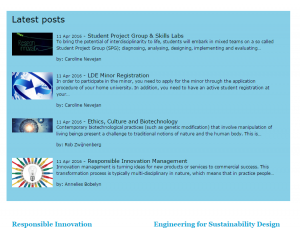Posted in April 2016
MOOC RI for credits (ECTS)
Currently TU Delft aims at setting up an alliance with several international partners, like the University of Queensland, the University of British Columbia, EPFL, Rice University and Australian National University. Their shared ambition is to recognize and integrate MOOCs in (formal) campus education. This would mean that in the future any student registered at one of the partner universities can take any MOOC offered by these universities and be awarded formal Credits for it.
To quote Anka Mulder, Vice-President for Education & Operations at TU Delft, : offering credits for MOOCs is a big step for brick and mortar universities.”
For the MOOC RI we have expressed our interest to participate in this pilot which be launched end of 2016. In the meantime, a lot of practical issues – like proctored exams, re-sits and obtaining formal recognition by the examination boards- have to be resolved.
EU projects Responsible Research and Innovation
Below an overview (not necessarily complete) of EU-funded RRI-projects
- ENGAGE2020 (http://engage2020.eu/)
The goal of Engage2020 is to increase the use of engagement methods and policies by mapping what is practiced and spreading awareness of the opportunities amongst researchers, policymakers and other interested parties. - GREAT (http://www.great-project.eu/)
The GREAT project aims to develop an empirically based and theoretically sound model of the role of responsible research and innovation governance and investigate the characteristics of responsible practices. - PERARES http://www.livingknowledge.org/projects/perares/
The PERARES project aims to strengthen public engagement in research by involving researchers and Civil Society Organisations in the formulation of research agendas and the research process. - PROGRESS (http://www.progressproject.eu/)
The ProGReSS project aims to advocate a European normative model for RRI globally, using constitutional values as a driver to inform societal desirability. - RESAGORA (http://res-agora.eu/news/)
The ResAGorA project aims at doing extensive research about existing RRI governance across different scientific and technological areas, continuous monitoring of RRI trends and developments in selected countries, and constructive negotiations and deliberation between key stakeholders. - RESPONSIBILITY (http://responsibility-rri.eu/)
The goal of the Responsibility project is to develop a virtual observatory for enhancing the interaction among research outcomes and policy making, incorporating the full potential of scientific achievements in the policy development and implementation. - RRI-tools http://www.rri-tools.eu/
This project develops a toolkit for RRI - ENRRICH (http://www.livingknowledge.org/projects/enrrich/)
The Enhancing Responsible Research and Innovation through Curricula in Higher Education (EnRRICH) project will improve the capacity of students and staff in higher education to develop knowledge, skills and attitudes to support the embedding of Responsible Research and Innovation (RRI) in curricula by responding to the research needs of society as expressed by civil society organisations (CSOs) - KARIM (http://www.karimnetwork.com/)
KARIM is the Knowledge Acceleration and Responsible Innovation Meta-network, a European project that aimed to develop transnational connections between universities, innovation-support agencies and SMEs, with a focus on responsible innovation
Website with open educational resources and student’s work
One of the deliverables of the project is an interactive website which will integrate 2 minors (Responsible innovation and international development and entrepreneurship) one course (Engineering for Sustainable Design) and our large collection of open education materials.
Students will use the resources but also publish the results of their projects and research. This will be done by a peer reviewed process which is currently under development.
MOOC RI is live since April 11, 2016
The MOOC Responsible Innovation is live since since April 11, 2016. The course consists of 3 parts:
- In part 1, we will focus on ethics and values including individual and collective responsibilities. For example, who is to blame in a case of a fatal accident when many parties are involved? How should we deal with conflicting demands, ethical issues and emotions when it comes to new technology?
We will also discuss the famous trolley problem and the NIMBY (Not in my backyard) problem,. Our case studies concerns robotics - The second part of the course (start: April 24, 2016) is all about safety and risk assessments. We will discuss the fundamentals of understanding and identifying risk. Our case studies are climate change, nanoparticles, coolants, nuclear energy and Cyber-Security.
- The third part (start May 9, 2016) will first focus on technological innovations – incremental, radical and frugal – from an economic, management and design aspect. Last, but not least, the course will end with the concept of Value-Sensitive Design and this is what our final assignment will be all about.
Below the weblecture about ethics and care robots.


Recent Comments